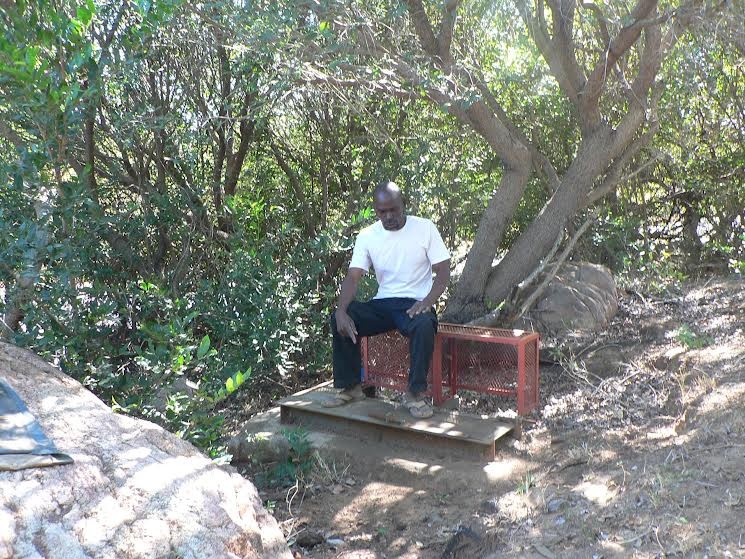
13 June 2024
Farmer Ali Baloyi sits on what is left of his water pump near the Letaba River. He says he can no longer earn a living. Photos: Bernard Chiguvare
Small vegetable farmers who were evicted from the land they were using near Phalaborwa, Limpopo, to make way for a commercial farm are battling to make a living.
The 20 farmers, members of the Mopani Farmers’ Association, had been farming on communal land under the Majeje Tribal Authority since 2014. They farmed vegetables, green pepper, okra, butternut and chillies, selling their produce locally or sending it to Johannesburg. Some of them had employees. Some donated produce to schools in the area.
In July 2022, the farmers suddenly found that fencing poles had been erected on the land. They went to complain to chief Mlungisi Ntsanwisi, who said a fruit farmer was due to move onto the land. A few days later, the farmers say, excavators moved onto the land and destroyed their crops.
To get the views of Ntsanwisi, the farmers referred GroundUp to the chief’s special advisor, Boela Bruwer. Bruwer denied that he is the special advisor to the chief and said he had no say over Majeje community issues. (GroundUp is in possession of a letter emailed on 15 February 2024 to one of the farmers in which Bruwer described himself as an advisor to the Majeje Tribal Authority.)
But, he said, the farmers had been removed by members of the community “because they have no PTOs and they did not create work for the unemployed”. A PTO is a document giving permission to operate the land.
But GroundUp has seen a letter dated 14 April 2016 from the Majeje Traditional Authority to one of the farmers, Ali Baloyi, giving him “permission to perform agricultural activities” in the area. The letter is signed by Ntsanwisi and sent by “P.N. Mabobo”, who is described as “chief councillor”.
Contacted by GroundUp, Mabobo said that he did not have much information about the eviction of the farmers. He provided a contact number for the chief and advised GroundUp to call after 10 am. GroundUp made several calls but there was no response.
Some of the evicted farmers have rented land or started growing crops on other communal land near where they used to farm. Others, like Baloyi, are battling to feed their families.
Baloyi showed Groundup the land from which he had been evicted. He managed to salvage his irrigation pipes but lost other equipment.
Sitting on his broken pump next to the Letaba River, Baloyi said: “I have no clue as to how I should eke out a living. Farming was my only means of putting food on the table. What is surprising is that the chief granted us permission but now he decided to evict us.”
The land on which the 20 farmers used to grow vegetables is to be used for a commercial fruit farming project.
Mawewe Nkhwashu, a manager at Mopani Farmers Association, said evicting the farmers had deprived them of their living. “There are very limited chances of employment in rural areas. Farming is the only means the farmers could provide for the family,” he said.
Asked whether the association had approached the chief on behalf of the farmers, Nkhwashu said his association had tried many times, but to no avail.
Lawyers for Human Rights attorney Louise du Plessis said; “LHR finds it despicable that poor people are thrown into worse poverty because of these kinds of unlawful actions by people who have more power than them. There are ways to deal with these situations in the interest of all involved.”
She said the farmers could still institute a damages claim, up to three years from the day they were evicted. “There is a possibility that they can still go to the Land Court to restore the rights they have,” she said.
Dr Fani Ncapayi from the Trust for Community Outreach and Education said the evictions “represent a new form of land dispossession” by traditional authorities. “The evictions reverse the land reform process,” he said.
Linda Page, chief director of communications in the Limpopo Department of Agriculture, Land Reform and Rural Development, said the department had tried to intervene “by mobilising relevant stakeholders like the Department of Cooperative Governance and Traditional Affairs”. But the chief was disputing the allocation of land to the affected farmers, she said.
Page said the department advised the farmers to approach the nearest legal resources centre at Tzaneen Magistrate court for intervention.
”The chief has no soft heart for small scale farmers,” said Baloyi. We were evicted when we were in the process of harvesting our crops.”
With no land to farm, he has resorted to buying tomatoes from other farmers to sell in the nearby villages.